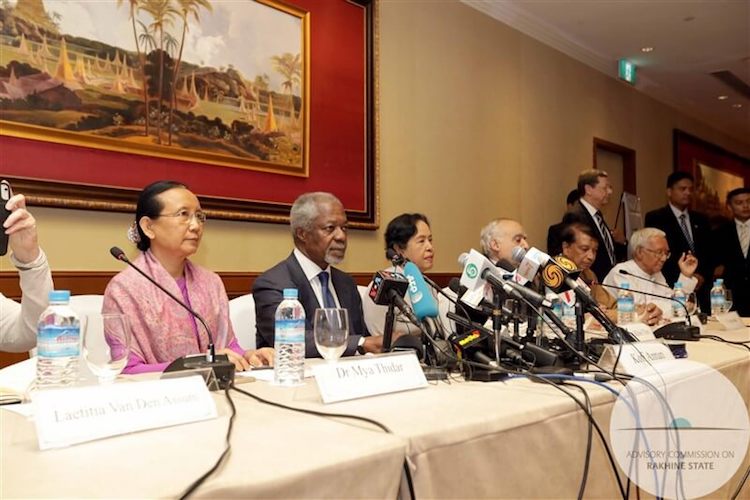By Ye Htut*
Ye Htut was the Minister for the Ministry of Information of Myanmar (formerly Burma) from 2014 to 2016 and spokesperson for the President from 2013 to 2016. He previously served as a Lieutenant Colonel in Myanmar Army.
NAYPYIDAW (IDN-INPS) – On August 23, 2016 Myanmar’s de facto leader Daw Aung San Suu Kyi announced the formation of an Advisory Commission on Rakhine State. This Commission, established on September 5, 2016, is led by former Secretary-General of the United Nations, Kofi Annan, and with three international and six Myanmar experts as members of the Commission.
The aim of this “Annan Commission” as it is popularly called, was to find the best possible solutions to the prevailing problems in Rakhine. The Commission would submit its findings and recommendations to the Government of Myanmar within twelve months of its establishment.
One year later, the Annan Commission has delivered its full report and detailed list of 88 recommendations. The Commission had issued a preliminary report earlier in March 2017.
The Rakhine ethnic party and community refused to cooperate with the Annan Commission. Bengali/Rohingya extremists responded with simultaneous attacks on Border Guard headquarters and police outposts on October 9, 2016.
Since then, the security situation in Northern Rakhine has been going downhill. In the past six months, the terrorists have killed dozens of moderate Muslims as well as ethnic Rakhine villagers. Domestic security forces (police) and civilian administrators cannot enter the Muslim villages without security provided by the military. The military’s security forces have also found many terrorist training camps. On the political front, the Rakhine issue has caused a divide between the ruling National League for Democracy (NLD) and other parties.
Daw Suu’s intention in establishing an international advisory commission was to reduce international pressure on the issue, as well as ease tensions between the two communities in Rakhine. But she misgauged the depth and complexity of the Rakhine issue. The ethnic Rakhine, who are already suspicious of the impartiality of the United Nations and international organizations on this issue, are deeply upset by what they feel is Daw Suu’s failure to consult them before forming the advisory commission.
As for the Bengali extremists, their main concern is that with Daw Suu in power and with an international committee on Rakhine, the international community will start to lose interest in Rohingya issues.
Calls by the Arakan National Party (ANP) and other political parties for strengthening security and restoring law and order in Nothern Rakhine, as well as for imposing martial law in Northern Rakhine were rejected earlier. Until recently, the government had been reluctant to declare Arakan Rohingya Salvation Army (ARSA) as a terrorist group under the 2014 Anti-Terrorist Law.
In August 2017, ANP leaders directly met with the Commander-in-Chief of the Myanmar Armed Forces and asked for military reinforcements, and the military air-lifted in troops the following day, while ethnic Rakhines staged large demonstrations in 15 major cities calling for NGOs to be expelled from Rakhine State, and security for ethnic Rakhines.
Daw Suu’s intent has been to gain more time and space to introduce a new initiative on the Rakhine issue via the Annan Commission’s recommendation. When the Commission submitted its final report on 24 August, Daw Suu issued a statement the same day pledging to implement the recommendations fully, and requesting all parties to focus on resolving and not inflaming the issues in Rakhine.
But while the Rakhine ethnic groups were studying the Commission’s recommendations, ARSA responded by attacking 19 police stations and the headquarters of one Army regiment in the morning of August 25, leaving 11 members of security forces and 77 terrorists dead. Fighting continued on 26 August, and many Buddhist and Hindu villagers are fled the area (Muslim are 98% of population in Northern Rakhine). Daw Suu is now trying to save the situation by denouncing the attack and declaring ARSA as terrorist organization.
The reality, however, is that however well-intended, the Annan Commission’s recommendations cannot be implemented without law and order returning to Northern Rakhine, and trust won back from the ethnic Rakhine community.
*Mr Ye Htut is Visiting Senior Fellow at the institute and a former Information Minister of Myanmar. This article was first published on 29 August 2017 on the website of The Institute of Southeast Asian Studies (ISEAS), an autonomous organization established by an Act of Parliament in 1968. It was renamed ISEAS – Yusof Ishak Institute in August 2015. It is being reproduced courtesy of the author and the Institute. The facts and views expressed are solely that of the author and do not necessarily reflect that of the ISEAS. [IDN-InDepthNews – 1 September 2017]
Photo: Kofi Annan (second from left) and Aung San Suu Kyi (right of Annan) introducing the report of the Advisory Commission on Rakhine State.
IDN is flagship agency of the International Press Syndicate
facebook.com/IDN.GoingDeeper – twitter.com/InDepthNews

